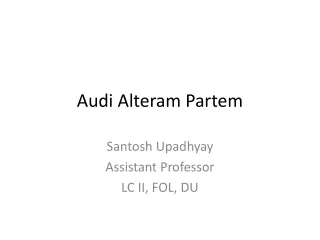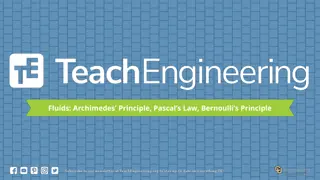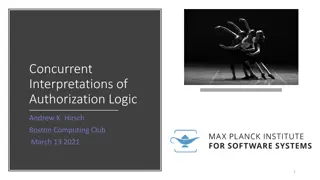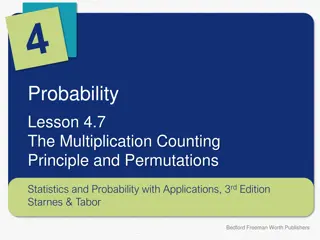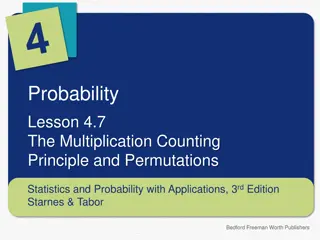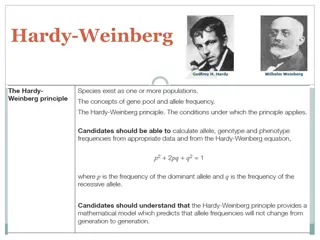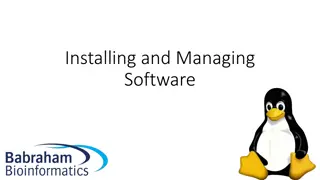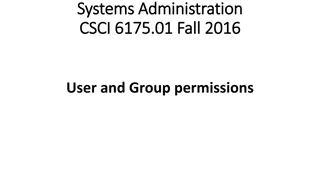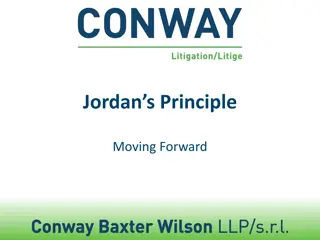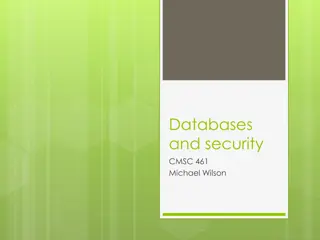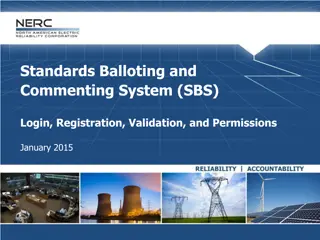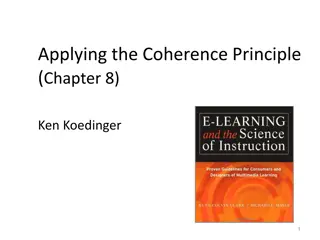Audi Alteram Partem
Explore the fundamental concept of fairness and justice in human society through the principle of Audi Alteram Partem, which ensures that both sides are heard before passing a judgement. This principle is a basic requirement of the rule of law and is essential for upholding civilised society.
1 views • 35 slides
Understanding Boat Floatation with Archimedes Principle
Explore the concept of why boats float using Archimedes' principle, which explains the relationship between density, volume, and buoyancy. Discover how objects sink or float based on their density relative to water, and experience a hands-on investigation to witness these principles in action.
5 views • 11 slides
Launchpad Operations and Security Enhancements
Explore the evolution of Launchpad, a key tool for managing SACR settings and user permissions within academic institutions. From its development by CIBER to modifications by SBCTC, learn how Launchpad facilitates secure copying of settings between users while ensuring data integrity and compliance.
1 views • 16 slides
Heisenberg's Uncertainty Principle in Elementary Quantum Mechanics
Heisenberg's Uncertainty Principle, proposed by German scientist Werner Heisenberg in 1927, states the impossibility of simultaneously and accurately determining the position and momentum of microscopic particles like electrons. This principle challenges classical concepts of definite position and m
0 views • 49 slides
Counting Principles and Pigeonhole Principle Explained
Explore the concepts of counting principles and the pigeonhole principle through practical examples and tips. Learn how to apply these principles to solve problems effectively. From understanding basic counting rules to the advanced pigeonhole principle, this content provides insights and guidance o
2 views • 35 slides
Overview of Housing Supply and Economic Impact in the UK
England experienced a significant increase in housing supply in 2022/23, with new build completions and conversions contributing to a record-breaking net supply of 320,000 homes per year. Despite challenges in planning permissions and government interventions, the home building industry supported th
2 views • 14 slides
Understanding Fluid Mechanics: Archimedes, Pascal, and Bernoulli
Explore the principles of fluid mechanics including Archimedes' Principle, Pascal's Law, and Bernoulli's Principle. Learn about mass density, buoyant force, and the behavior of floating objects in liquids. Discover how the buoyant force is equal to the weight of displaced fluids, and how it affects
0 views • 22 slides
Concurrent Interpretations of Authorization Logic
Explore the concepts of authorization logic through discussions on policy enforcement, permissions, logical implications, and security theorems in the context of a scenario involving Alice, UdS Students, and printing permissions.
0 views • 50 slides
Understanding Linux User Capabilities and Namespace Management
Linux user namespaces and capabilities play a critical role in managing system security and permissions. Users and groups are assigned unique IDs, and processes are associated with the user's ID. The kernel enforces permission checks based on user IDs and group IDs, allowing root access to bypass ce
0 views • 14 slides
Understanding Filesystems: A Comprehensive Overview
File systems provide a structured approach to storing and organizing data on secondary storage devices. They involve logical organization of files, directories for grouping related files, sharing data between users, and managing permissions. Files contain data with attributes like size, ownership, a
3 views • 29 slides
Understanding Buoyancy and Archimedes Principle
Explore the concepts of buoyancy, Archimedes principle, sink or float scenarios, and examples related to buoyant force calculations and floating objects. Learn how buoyant force determines whether objects sink or float in liquids, and understand the relationship between object density and fluid dens
0 views • 9 slides
Understanding Classical Mechanics: Variational Principle and Applications
Classical Mechanics explores the Variational Principle in the calculus of variations, offering a method to determine maximum values of quantities dependent on functions. This principle, rooted in the wave function, aids in finding parameter values such as expectation values independently of the coor
0 views • 16 slides
Understanding the Outer Space Treaty and the Lotus Principle
The Outer Space Treaty, comprising Articles I and II, establishes regulations on the exploration and use of outer space, emphasizing the benefit of all countries and free access to celestial bodies. The Lotus Principle, illustrated by the S.S. Lotus case, highlights that actions not explicitly banne
1 views • 4 slides
Understanding Electric Potential and Work Energy Principle in Physics
Exploring electric potential and work energy principle in physics, this content discusses the conservative nature of electric force, potential energy of charges, electric potential energy calculations, and work done by external agents to move charges. Practical problems and theoretical concepts are
0 views • 59 slides
Understanding Le Chatelier's Principle in Chemical Equilibrium
Le Chatelier's Principle states that when a system at equilibrium is disturbed by changes in concentration, temperature, or pressure, the equilibrium shifts to counteract the change. This principle can be applied to predict the direction of equilibrium when changes occur. Changes in concentration, p
0 views • 10 slides
Understanding the Multiplication Counting Principle in Probability
The Multiplication Counting Principle and Permutations play a crucial role in determining the number of possible outcomes in various processes. This lesson covers how to use factorials to count permutations, compute arrangements of individuals, and apply the multiplication counting principle to dete
0 views • 14 slides
Understanding Jordan's Principle and Its Impact on First Nations and Inuit Children in Canada
Jordan's Principle was named in memory of Jordan River Anderson, a young boy whose tragic story led to the establishment of a legal requirement ensuring access to services for First Nations and Inuit children in Canada without delays or disruptions. This principle aims to prevent situations where ch
0 views • 9 slides
Understanding Android App Development Basics
Android apps operate within a secure, multi-user environment with each app having its own user identity and permissions. Components like Activities, Services, Receivers, and Providers handle various aspects of app functionality. Permissions safeguard user privacy by controlling access. Developers mu
0 views • 20 slides
Understanding Fluids, States of Matter, and Phase Changes
Exploring key concepts in physics including Bernoulli's Principle, viscosity, cohesion, states of matter (solid, liquid, gas, plasma), phase changes (evaporation, condensation, etc.), density, pressure, and more. Discover the properties and behaviors of fluids in relation to gases and liquids, along
1 views • 54 slides
Understanding the Acceleration of the Universe and the Equivalence Principle Violation in the Horndeski Vector-Tensor Theory
Exploring the implications of the Equivalence Principle Violation after reheating in the context of the accelerated expansion of the universe. The study delves into the Horndeski vector-tensor theory, gravitational waves, and the impact of modified gravity and dark energy. Insights are provided on t
2 views • 20 slides
The Multiplication Counting Principle in Probability: Exploring Permutations
Exploring the multiplication counting principle in probability, this lesson delves into determining the number of ways to complete a process involving multiple steps. Using factorials for permutations, the content showcases how to compute permutations of individuals taken at a time. Through examples
0 views • 20 slides
Understanding Hardy-Weinberg Principle and Genetic Frequencies
Gene pool and allele frequencies play a crucial role in the Hardy-Weinberg Principle, a mathematical model predicting allele frequencies over generations. The principle outlines conditions like a large population, absence of mutations, random mating, and more. Equations such as p² + 2pq + q² = 1 h
0 views • 44 slides
Managing and Editing Staff Accounts in Your System
Explore the process of creating, managing, and editing staff accounts in your system. Learn about different staff account types, group permissions, creating staff accounts, defining course lists, assigning reason specialties, and managing certifications and work plans. Gain insights into how staff a
0 views • 12 slides
Understanding Software Installation and Management
Different types of software require various methods of installation and management such as interpreted scripts, pre-compiled binaries, and source code. It's important to comprehend users, roles, and permissions in software installation, including the significance of user privileges and file/director
0 views • 42 slides
Principle of Majority Rule in Company Law
The principle of majority rule is a fundamental aspect of company law, where the powers of control over a company rest with the general meeting representing the majority shareholders. This principle emphasizes that decisions are made by a simple or special majority vote, except for powers vested in
0 views • 9 slides
Proportionality as Core Principle in Supervising Heterogeneous Banking Sectors: Lessons from Germany
The supervision of a diverse banking sector, such as Germany's with roughly 2,000 banks, is based on the core principle of proportionality. This approach involves tailoring regulations and oversight to fit the individual characteristics of each institution, focusing on qualitative aspects, organizat
0 views • 8 slides
Understanding Linux File Permissions and Security Practices
Explore how Linux file permissions work, including the concepts of read, write, and execute permissions for files and directories. Learn about changing permissions using the `chmod` command and how umask affects default permissions when creating files. Enhance your understanding of securing software
0 views • 9 slides
Understanding UNIX System Permissions and User Terminology
Explore the concept of UNIX system permissions, including discretionary access control (DAC) model, user terminology, file/directory access, access permission modes, categories of users, and checking permissions using examples. Learn about user IDs, groups, superuser privileges, ownership, access mo
0 views • 24 slides
Understanding File Permissions and Ownership in Linux
This content discusses the concept of file permissions and ownership in Linux, covering the three levels of ownership (owner, group, everybody), the usage of the 'ls -l' and 'id' commands to check identity information, changing file permissions using the 'chmod' command with octal notation, and meth
0 views • 5 slides
Understanding User and Group Permissions in Linux Systems
Linux uses user and group permissions to control access to files, directories, and peripherals. Users are managed for security purposes by limiting access, with the root user having full system access. Grouping users into groups with specific access grants can enhance security. Each file is owned by
0 views • 23 slides
Jordan's Principle: Advocating for First Nations Children's Rights
Jordan's Principle is a vital advocacy tool aimed at ensuring equitable access to necessary services for First Nations children, emphasizing prompt resolution of jurisdictional disputes. Originating from the story of Jordan River Anderson, its implementation has faced challenges and legal battles. C
0 views • 21 slides
Understanding User Permissions in Database Management Systems
Database Management Systems (DBMS) offer security measures to control user accesses and permissions. Users can be assigned specific access rights and commands. This guide explains concepts like creating users, granting privileges, managing roles, and using GRANT commands effectively in DBMS.
0 views • 12 slides
Government Agenda for Brownfield Land Development
Unpacking the government agenda for brownfield land development involves key elements such as the Brownfield Register, Permissions in Principle, Local Plan Changes, and the push to convert office spaces to residential units. The government is committed to utilizing brownfield land efficiently, setti
0 views • 47 slides
Understanding the Pigeonhole Principle in Mathematics
The Pigeonhole Principle, demonstrated through examples and explanations by Dr. J. Frost, illustrates the concept that if you have more "pigeons" than "holes," then at least one "hole" must contain multiple "pigeons." This fundamental principle is essential in solving various mathematical problems i
0 views • 27 slides
Understanding the Reciprocity Principle in Public Procurement Markets
The concept of reciprocity in access to public procurement markets, particularly in the European Union, has gained prominence in recent years. This principle involves mutual opening obligations for public procurement markets while considering concessions and exceptions, such as excluding defense and
0 views • 4 slides
Android Permissions Overview
This detailed overview provides insights into the various permissions categories in Android, including location, hardware, services, Bluetooth, accounts, text messaging, user information, phone calls, and miscellaneous permissions like voicemail access and system functionalities. Each section highli
0 views • 24 slides
Writing Lab: Principal vs. Principle
Learn the differences between "principal" and "principle" with this informative Writing Lab mini-lesson. Understand their varied meanings as nouns and adjectives, and how they are used in different contexts. Enhance your diction skills and avoid common usage errors. Enjoy learning about the principa
0 views • 4 slides
Standards Balloting and Commenting System (SBS) Overview
Learn about the roles and permissions in the Standards Balloting and Commenting System (SBS), including registration, validation, and accessing the ERO Platform. Find out who needs an ERO Platform account, additional permissions required for various roles, and how to navigate the SBS for casting vot
0 views • 24 slides
Enhancing Student Learning Through Coherence Principle
The Coherence Principle emphasizes the importance of excluding extraneous, entertaining materials to improve student learning. Including such materials can compete for cognitive resources and divert attention from essential information. Utilizing simpler visuals and avoiding websites that violate th
0 views • 7 slides
Understanding the Generalized Pigeonhole Principle in Discrete Math
The Generalized Pigeonhole Principle is illustrated through an example involving selecting cards from a deck. By strategically grouping the cards, we determine the minimum number needed to guarantee at least three cards of the same suit are chosen. Additionally, the process is applied to finding the
1 views • 5 slides
